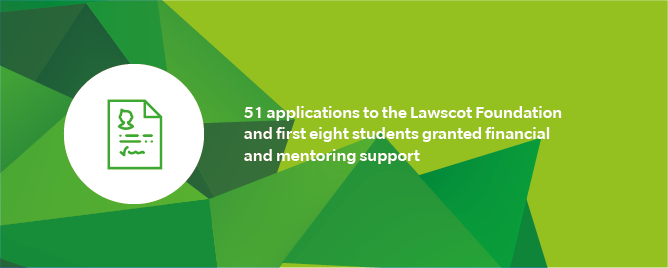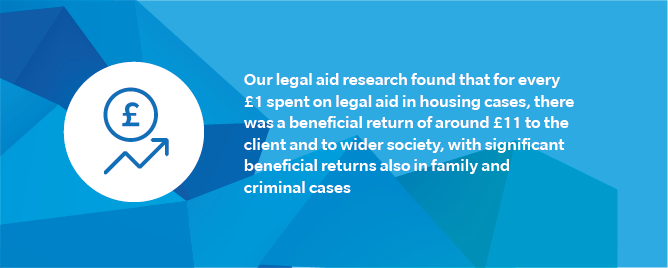Welcome to our annual report covering the period from 1 November 2016 to 31 October 2017.
As the professional body for over 11,000 Scottish solicitors, we have an overarching objective of leading legal excellence. We strive to excel and to be a world-class professional body, understanding and serving the needs of our members and the public. We set and uphold standards to ensure the provision of excellent legal services and ensure the public can have confidence in Scotland’s legal profession.
Our annual report covers our performance against the objectives set out in our 2016/17 annual plan. This was the second year of activity under our Leading Legal Excellence strategy.
If you have any questions about the content of our annual report, please get in touch.
 Over the past year, we have continued to campaign to support the profession and in the interests of the public and justice, while ensuring the necessary consumer protections are robust and effective.
Over the past year, we have continued to campaign to support the profession and in the interests of the public and justice, while ensuring the necessary consumer protections are robust and effective.
With ongoing, and significant, change to the way legal services are provided, we argued strongly for new, flexible legislation to replace the current patchwork governing solicitors. During the year, the Scottish Government established an independent review of the regulation of legal services. We met members of the review group and drafted a comprehensive response paper outlining the case for change.
Discussions with the government also took place over how to better shape the future of the legal aid system. In response to the independent review of legal aid, we called for an urgent overhaul of the system, increased investment and less bureaucracy. Our high-profile #DefendLegalAid campaign continued, focussing on the importance of legal aid and access to justice, and our research work highlighted the preventative benefits of legal aid. For instance, for every £1 spent on legal aid in housing cases, we found there was a beneficial return of around £11 to the client and to wider society, with significant beneficial returns also in family and criminal defence cases.
During the year, the Council agreed to commence legal proceedings against the Scottish Legal Complaints Commission (SLCC) to get clarity on how existing hybrid complaints issues should be handled in light of a previous court ruling that they were unlawful. We were concerned by the SLCC’s new approach for dealing with complaints already in the system, which involved re-categorising a number of cases that were already in progress and identified as having conduct within them as service only, removing our power to investigate and, if required, pursue disciplinary action against individual solicitors. Our decision to take the matter to the Court of Session was a difficult one. We made every attempt to try to resolve the issue by working with the SLCC and offered to take a joint special case to the court to get legal clarity. However, this offer was rejected by the SLCC board.
Although it was a split decision, the court ruling found that the SLCC did have the power to re-categorise complaints issues already classed as hybrid. The judges admitted it was a highly complex case and the divergent views within the final judgment underlined that complexity and showed how difficult it was to identify the correct way forward. It also helped to prevent any attempt to unpick historic cases.
In January 2017, we were approved as a regulator of licensed legal services providers (LPs). However, before we can accept applications from interested businesses to become LPs, Scottish ministers have to authorise us to act. We are still engaged in discussions with Scottish Government officials and the SLCC about a number of outstanding matters, including the scheme for complaints made against approved regulators. We will also need to resubmit our regulatory scheme because of other changes to practice rules, specifically those required around anti-money laundering as a result of the EU’s fourth directive and regulations.
In other work to influence the many changes taking place, we provided a leading voice for the solicitors’ profession and the public as the UK continues the process of withdrawing from the European Union, participating in a number of high-profile events and responding promptly and fully to government policy positions and legislative proposals. Our new Public Policy Committee took forward a range of other priority policy proposals including making the case for the creation of an Equalities and Human Rights Ombuds in Scotland.
We continued our extensive programme of engagement with members in all sectors, visiting solicitors around Scotland – and elsewhere in the UK – as well as holding meetings with specific sectors, such as in-house lawyers. This annual rolling programme of meetings gives a face to our name no matter how far away from our Edinburgh office a member may be and ensures we can listen to our members and respond to their needs.
As ever, all those who sit on our governing Council, committees and working groups are due enormous credit for all the work they carry out on behalf of the profession and the public – a big thanks to all.
Graham Matthews
President of the Law Society of Scotland
 Technology continues to transform the delivery of legal services. Used effectively, it offers many business advantages – increasing efficiency, reducing costs and allowing innovative ways of working. But technological advances have created challenges too.
Technology continues to transform the delivery of legal services. Used effectively, it offers many business advantages – increasing efficiency, reducing costs and allowing innovative ways of working. But technological advances have created challenges too.
In concentrating on areas of business and professional support, we provided a range of new services to our members, including producing well-received cybersecurity guidance to help solicitors and their colleagues understand and avert cyber threats. We also conducted a technology audit of the profession and staged a technology and cybercrime conference in Glasgow. Among other new services, we developed a new, world-class website and launched a massive open online course (MOOC) on shipping law. We also worked with the Scottish Government and its agencies in using digital technology to improve the justice system, for instance, completing research around public-facing technology and access to justice, and considering the potential for public legal education, crowdfunding, online dispute resolution, online courts and artificial intelligence.
Our membership numbers continued to grow throughout the year, both our core practicing solicitor members and our new associate categories. We introduced the Accredited Paralegal scheme to replace our previous registered paralegals, acquiring the intellectual property rights for the term and promoting the new status. Student Associates continued to grow in numbers and and we improved our communication of the value of membership for those growing number of members outside of Scotland, not practising and retained on the roll.
Among other key improvement projects last year, we moved forward with the development of new, alternative routes to qualification, continued to grow our non-core income and considered ways to improve the way we handle conduct complaints.
We introduced a much-improved and varied continuing professional development service, restructuring our team – now known as CPD and Training – and changing the ways we deliver CPD. The results exceeded expectations, with 3,500 members welcomed to 94 events and revenue increasing more than 40% to £540,000 – the highest level on record. Our new live webinars attracted high viewing numbers – an exciting start to significant plans in the area of online learning. I really recommend you take a look at our upcoming events.
Increasing numbers across almost all membership categories and generating non-membership income through services such as CPD are amongst the reasons for keeping the cost of our practising certificate at the same level as the previous year.
In seeking to better promote the information we provide to the public – in particular, through our popular, online Find a Solicitor search tool – we launched a campaign encouraging potential clients to consult a regulated Scottish solicitor.
Our charity, the Lawscot Foundation, was successfully launched with the aim of helping academically talented students from less-advantaged backgrounds through their legal education. We organised various fundraising initiatives and eight students starting law degrees in the autumn were selected to receive the first bursaries and mentoring. The successful candidates were inspirational, with some facing huge challenges at a young age, and will no doubt prove a credit to the profession and make positive contributions to society in the years to come. I would encourage members who can, to support its great work and I thank those who have and have already made the early work of the Foundation possible.
Of course, the many achievements of the past year have only been possible with the efforts of my colleagues – they deserve our gratitude for their hard work, diligence and commitment. It remains an immense pleasure to be part of that team.
Lorna Jack
CEO of the Law Society of Scotland



Financial review
Our income in 2016-17 amounted to £11.50 million, an increase of 5.1% from last year.







